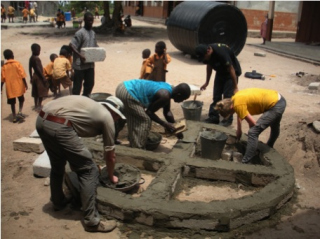About Ekumfi Ebiram
Ebiram is a community of about 260 homes with a population of
approximately 1.250 people. As it is closely located to the Gulf of Guinea,
community members' options to collect fresh water is limited since many of
the underground water sources are saline and not useable for basic
consumption needs.
Ebiram is a traditional Ghanaian farming community that grows coastal
Ghanaian crops like cassava, yam, tomatoes, pineapple, peppers, plaintain
and maize. Ebiram has 6 Community Health Volunteers trained to administer
first aid to children ages 0 to 5. The community also has a Basic Sanitation
Committee that actively assists community members to keep their
surroundings clean.
Global Brigades currently operates Medical, Dental, Microfinance, Business
and Water Brigades in the community.
Ekumfi Ebiram's Water Challenge
The two main water challenges in the Ekumfi district are: water access
and water quality. Where piped water is not available, rainwater is the most
culturally accepted form of drinking water. When rainwater is not available,
community members will often go to rivers or small dug out ponds for water.
The main water issues faced by most communities in the Ekumfi District are
directly related to its geographic location, especially its close proximity to the
sea. Salty seawater has intruded most communities' underground water
resources, making most groundwater sources unusable for basic consumption needs and a possible health hazard. Besides ground water posing a possible threat to peoples' health, so do most surface water sources like rivers, ponds and streams. Ebiram's residents fetch water for domestic use out of a stagnant pond on the west-side of the community. All domestic water use is from this pond and many community members drink and cook with this water as well as use it for bathing purposes. Furthermore, most women and children spend many hours a day collecting water in open containers and carrying it back home.
The water from Ebiram's pond is rarely treated before consumption and using this water for personal consumption can lead to diarrhea, cholera, skin rash, bilharzia and other water related diseases and infections. One of the few safe water options for Ebiram's community members is purchasing water sachets but this is an unsustainable practice as well as an unreliable and in the long-term expensive option for drinking water.
The Water Solution for Ekumfi Ebiram

Water Brigades Ghana has focused on three types of water solutions in the Ekumfi District : School Rainwater Harvesters, Community-Wide Rainwater Harvesters and Household Rainwater Harvesters. In January 2012, Dublin City University constructed a School Rainwater Harvester in Ebiram to improve student health and studies as well as helped set up a School Water Club responsible for gathering clean water for each classroom. Each class had also been given a Family LifeStraw filter of Sawyer filter to use. Although the School Rainwater Harvester is beneficial to students while in school, it is not a solution that can provide consistent access to clean water especially because children often drink contaminated river water when at home.
Current Status
Last Visit: October, 2013
SRH is functioning well. Two out of four tanks have showed leakages but have been repaired by a plumber. School Water Club is running well.
Visit Other Programs in Ekumfi Ebiram
Global Brigades strives to implement a model of Holistic Development in communities through a system of collectively implementing health, economic, and education initiatives to strategically meet a community's development goals. Learn more about the other programs being implemented in Ekumfi Ebiram:
![]() Business
Business CHW
CHW![]() Dental
Dental![]() Medical
Medical ![]() Microfinance
Microfinance
| Project Overview | |
|
Beneficiaries SRH |
350 |
| Volunteers | 10 |
| Project Cost |
1000 USD |
|
# of SRH systems |
1 |
| Additional Information |
| General Community Profile |
| Family Profiles |
| Water Brigade Update Report |
| Pre-Brigade Lesson Plan |
| On-Brigade Lesson Plan |
| School Rainwater Harvester Construction in Ekumfi Ekotsi |
|||
| Water Brigades Chapter | Month | Volunteers | # SRHs Constructed |
| Dublin City University | January, 2012 |
10 |
1 |
